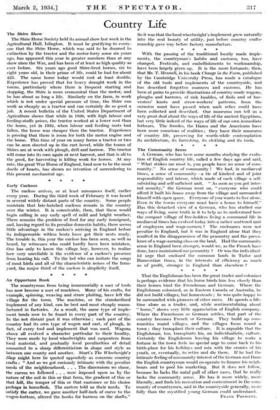The Community Sense A German, who has been some months
studying the evolu- tion of English country life, called a few days ago and said, " What strikes me most is, you people have no sense of com- munity." No sense of community ! We had, in mediaeval times, a sense of community—a tie of kindred and of joint responsibility and labour, which made of each village a self- subsisting and self-sufficient unit. " As soon as you got inter- nal security," the German went on, " everyone who could afford it built his house away from the village and surrounded himself with open space. Everyone of you wants to live alone. Even in the towns everyone must have a house to himself." Has this detached view of a German, who has studied our ways of living, some truth in it to help us to understand how the compact village of free-holders living a communal life in mediaeval times has evolved today into a rather scattered unit. of employers and wage-earners ? The enclosures were not peculiar to England, but it was in England alone that they resulted in the disappearance of the peasantry and the preva- lence of a wage-earning class on the land. Had the community sense in England been stronger, would we, as the French have done, have maintained our peasantry ? Or was the individual- ist urge that enclosed the common lands in Tudor and Hanoverian times, in the interests of efficiency as much as of profit, stronger in England than elsewhere ?




























































 Previous page
Previous page